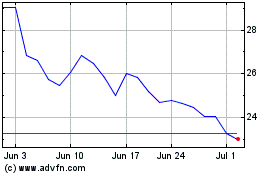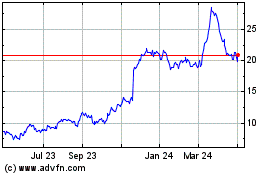By Lauren Weber
Around 10 times a day, Sharon Padilla opens the Shyft app on her
smartphone, usually to find extra hours at the Buffalo Wild Wings
Inc. restaurant in Southern California where she works as a
server.
With the app, Ms. Padilla and her co-workers can view their
schedules and swap shifts when they've got a scheduling conflict or
need extra work.
Shyft is one of a new breed of smartphone apps that are putting
technology directly into the hands of workers and allowing them to
share information, make schedule changes, report labor violations
and potentially organize for change. Employers are watching such
apps warily, in some cases allowing workers to download them but
not expressly endorsing them, and in other cases, as with a new app
for Wal-Mart Stores Inc. associates, actively discouraging their
use.
While Ms. Padilla's manager asked her to download Shyft when she
took the job about six months ago, thousands of employees at chains
like Starbucks Corp. and Gap Inc.'s Old Navy have begun using the
app, sometimes without their bosses' blessings, to get more control
over their schedules, said Shyft co-founder Brett Patrontasch.
"That behavior is happening all the time at these stores
anyway," he said, noting that employees often text-message each
other to find subs. Apps update what is currently "a really analog"
process, saving employees and managers time and effort, he said.
While managers of individual stores may encourage workers to use
the app, no large employers have approved it enterprisewide, he
said.
Buffalo Wild Wings encourages franchisees "to use tools that are
most effective for them," a spokesman said.
Starbucks spokesman Reggie Borges said the company is aware of
the Shyft app, but doesn't know whether employees are using it. "We
encourage our partners to involve their managers when it comes to
making adjustments to their schedules," he said.
Manuel Castro's New York-based organization, New Immigrant
Community Empowerment, is testing Jornaler@, an app that allows day
laborers to record their hours and wages. "People understand what
sharing means now. They share their status, interests, wants,
needs," he said. "What else can they share? And what else can we
share with them, like information about labor rights?
Users of Jornaler@, which means laborer in Spanish, can upload
photos of license plates and work permits posted at construction
sites to capture details about employers. The data can be used to
file claims for wage theft, a widespread problem for day laborers,
and alert others about unsafe working conditions, or determine
whether an employer's wages are in line with the local market.
Developers and worker advocates say the apps substitute the kind
of intermediary role unions once played.
Jason Van Anden, the software developer who created WorkIt, an
information-sharing app for Wal-Mart employees, pulled up a recent
question posed on the app: "Can a department manager fire me
without any previous coachings?" -- referring to attempts to
improve an employee's performance.
"That's a good question," mused Mr. Van Anden, the CEO of
software development firm Quadrant 2 Inc. "If I'm that employee, am
I going to ask my manager, who I'm concerned is considering this?
Do I ask a co-worker? If there was a union, you'd be comfortable
asking the union rep." Talking to human resources, too, "opens a
can of worms," he added. "If you ask a question like that, they
say, 'why are you concerned you're going to be fired?' "
WorkIt, which uses a combination of artificial intelligence and
peer experts to answer questions, is a project of OUR Walmart, an
organization advocating for higher pay and other benefits. Wal-Mart
has discouraged employees from downloading the tool.
Unions are backing many of these nascent technology efforts. OUR
Walmart grew out of an organizing effort by United Food and
Commercial Workers International. And the Service Employees
International Union helped found the Workers Lab, an Oakland,
Calif.-based nonprofit that is exploring new ways to engage workers
outside the traditional methods of organized labor, particularly
through technology.
Last summer, the group helped launch an app called WorkerReport
to help individuals report violations of wage and safety laws. It
is currently being piloted in three cities.
Creators of tools like WorkerReport say users may be ready for
smartphone apps that can manage their work lives, but building a
large, dedicated user base is challenging.
"People don't download apps to report single incidents," said
Carmen Rojas, chief executive of the Workers Lab. "They're helpful
when people can return to them time and time again to get a
response or learn something useful."
Write to Lauren Weber at lauren.weber@wsj.com
(END) Dow Jones Newswires
January 03, 2017 10:14 ET (15:14 GMT)
Copyright (c) 2017 Dow Jones & Company, Inc.
Gap (NYSE:GPS)
Historical Stock Chart
From Mar 2024 to Apr 2024

Gap (NYSE:GPS)
Historical Stock Chart
From Apr 2023 to Apr 2024
